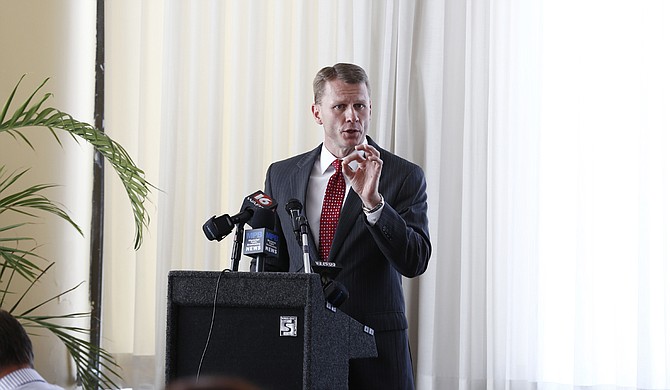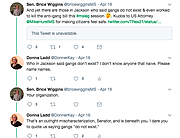Within a week of my reports in the JFP and The Guardian about that glaring disparity going viral, U.S. Attorney Mike Hurst had assembled heavily armed members of 15 agencies to swarm Jackson decidedly looking for gang members of all hues. Photo by Imani Khayyam.
Dozens of officers from 15 federal, state and local law-enforcement agencies gathered in a circle in front of the new colorful Jackson mural facing State Street meant to symbolize a better capital city. The Clarion-Ledger's cops reporter was invited to join the nighttime gang hunters with her video camera.
The videos the reporter later posted may not have included interviews of family members of the 45 people arrested that night, or with the man whose face she filmed pressed to a porch with a cop sitting on top of it, or with violence and gang experts around the country who would tell her, and local cops and political leaders here if they asked, that this "surge" is exactly the wrong way to go about making our communities safer.
U.S. Attorney General Jeff Sessions and President Donald Trump adore these kinds of old-school arrest sweeps, especially when used against people of color—which they usually are in America, even in states that have high numbers of white gang members and other criminals.
I reported recently that from 2010 to 2017, only African Americans (97 of them) were prosecuted under the state's existing gang law, even as the Mississippi Association of Gang Investigators is hawking the growth of white gangs over the last decade, telling the Ledger that 53 percent of the state's verified gang members are white.
Project EJECT Expels Gun Offenders to Faraway Prisons
U.S. Attorney General Jeff Sessions' Project EJECT is a controversial blast from the past.
If that is true—and it could be considering the growth of Simon City Royals, Aryan Brotherhood, Latin Kings (many are white, I'm told), biker gangs like the Bandidos and others—it means that the gang hunters are still targeting a lot of black people. Within a week of my reports in the JFP and The Guardian about that glaring disparity going viral, U.S. Attorney Mike Hurst had assembled heavily armed members of 15 agencies to swarm Jackson decidedly looking for gang members of all hues.
In his press conference, Hurst made a point to mention the Royals, the ABs and other white gang members rounded up in Jackson, and the Ledger cops reporter was sure to include images of white people arrested in her PR videos for the raid that really could be used as warrior cop recruitment. She even showed an officer in Army green with an AR-15 patch on his shoulder, holding a mugshot of a white suspect.
We got it. White arrests, too. Check.
But don't let all the posturing obscure the key point. This should not be a race to round up and film more white gang members just to prove law enforcement aren't racist (and it doesn't prove that anyway). Bad policing is bad policing even if you throw more white mugshots on the pile.
These sweeps are bad policing for everybody, just like cops high-speed-chasing shoplifters and killing bystanders, or firing into moving vehicles instead of getting out of the way. ("Move!" an NYPD captain told me is the response to a moving car.)
It's a fallacy to believe a traditionally racist-plus-bad policy is suddenly a smart one or no longer racist just because officials apply them to more white people. No, that just means more whites are victims of the practices that actually make them more likely to commit worse crimes.
This embrace of debunked practices is where it's really time to challenge law enforcement in Mississippi. This is not the wild, wild west anymore, and law enforcement aren't hired to be warriors in the OK Corral with AR-15 patches and he-man slogans like, "Certainly there is no hunting of man like the hunting of man, and those who have hunted armed men long enough and liked it, never really care for anything else thereafter." That, by the way, was an Ernest Hemingway quote the infamous Street Crimes Unit in New York City had printed on T-shirts to inspire them when they went prowling the streets at night there.
What they found was Amadou Diallo smoking in his front yard, whom they shot 41 times because he had a wallet in his hand. Then, the hunters were acquitted.
Much is written about the "warrior" mindset in policing. Sometimes, such as with Diallo's killers, it's hard to know which side of the gang fight is the most violent. And that should not ever be the case with the ones professing to be the good guys.
What good cops, and their leaders, do is constantly welcome new information about what works and what doesn't. Study. Train. Retrain. Question practices. It's the same thing I've done both in the craft of journalism, and it's the same thing I do to know what I know about crime policies. I read long evidence-based reports, talk to the best criminologists and crime researchers in the country, visit cities that are instituting smart policing strategies designed to prevent crime and not increase recidivism and grow gangs by packing more young people into violent prisons without trying to rehabilitate them first.
Those practices are antiquated policing that continue cycles of violence. And it's often done because a) no one has bothered to know any better (and that includes cops reporters) and b) they are doing it for the wrong reasons—votes, racism, meanness, feigned toughness, playing with artillery.
Mississippi has always been stubborn about seeking or letting in new information. David Kennedy and colleagues designed Operation Ceasefire, which Hurst told me is a model for Project EJECT. Kennedy scoffed at that in a later interview. Kennedy also told me he had evolved much about his model since the early Boston Gun Project, because he embraced feedback, data and research on what works for violence reduction and community trust, and what does not. (Hurst also mentioned the Boston project as a model for Project EJECT, which Kennedy roundly disputes.)
What doesn't work is rounding up people, squishing their faces into a porch or the pavement for the cameras, and then packing them into prisons across the country, per Kennedy and every top crime researcher in the country right now. Sessions may be salivating to re-ignite the mass-incarceration wave, but all of us will pay for that serious mistake here at home. Think about it this way: The need for re-entry programs wouldn't be so urgent if many people weren't coming out of prison hellholes ripe to commit more crime.
Oh, and let's put this straw man to rest. Even if Hurst, along with Sen. Brice Wiggins and the Ledger's cops reporter keep proclaiming that phantoms out here are saying that "gangs do not exist in Mississippi," no one with a brain is saying that. What we are saying, if they will actually listen, is that they are hawking the very strategies that will make gangs, and violent crime, worse and our state much less safe. This must stop.
Follow Donna Ladd on Twitter at @donnerkay. Read more about here about gangs in Mississippi, here on Project EJECT and here for the JFP's award-winning "preventing violence: series.
More like this story
- U.S. Attorney Touts 'Project EJECT' Sting of Alleged Gangsters, Criminals
- DOSSIER: Shame on WLBT for Dishonoring Past with Empty Crime Rhetoric
- Mayor Lumumba Hosting Crime and Justice Summit Tonight at 6 p.m.
- Trump, Acting AG Praise 'Project EJECT' Strategy as Jackson Homicides Surge
- Sessions-Backed Anti-Violence Grant Draws City Council Approval
More stories by this author
- EDITOR'S NOTE: 19 Years of Love, Hope, Miss S, Dr. S and Never, Ever Giving Up
- EDITOR'S NOTE: Systemic Racism Created Jackson’s Violence; More Policing Cannot Stop It
- Rest in Peace, Ronni Mott: Your Journalism Saved Lives. This I Know.
- EDITOR'S NOTE: Rest Well, Gov. Winter. We Will Keep Your Fire Burning.
- EDITOR'S NOTE: Truth and Journalism on the Front Lines of COVID-19






Comments
Use the comment form below to begin a discussion about this content.
comments powered by Disqus